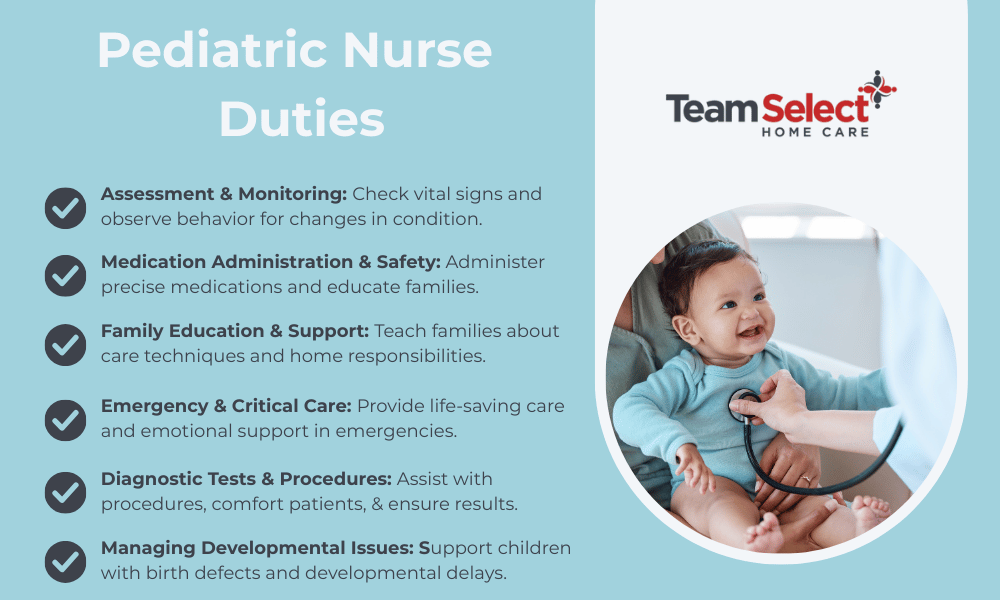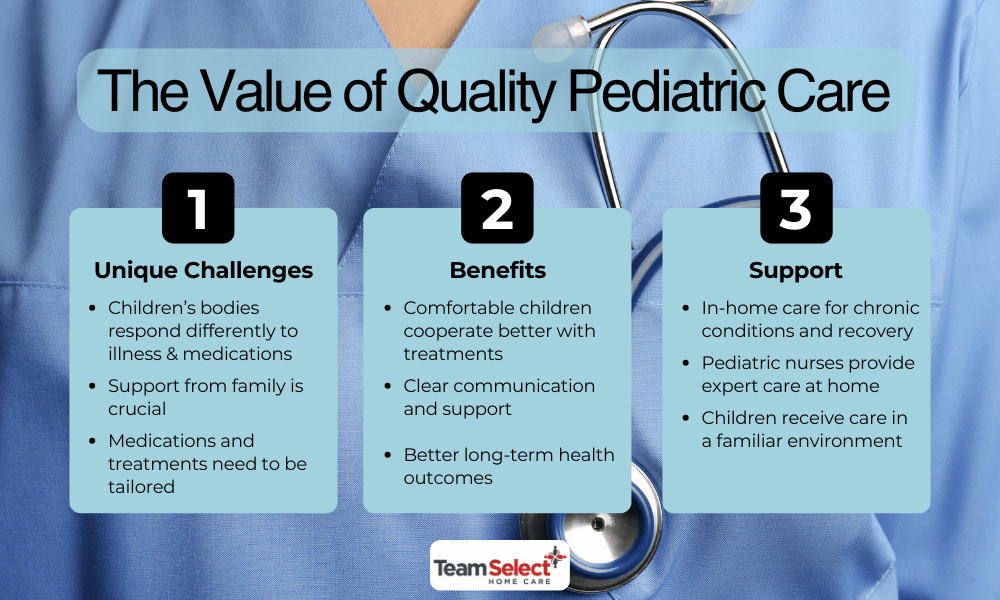A pediatric nurse is a registered nurse who focuses specifically on the healthcare needs of children and teenagers. These healthcare professionals work in hospitals, doctors’ offices, emergency departments, and even provide in-home nursing care for families who need ongoing support.
Their primary responsibilities include:
- Monitoring vital signs and tracking patient progress
- Administering medications safely for different age groups
- Providing emotional support to both young patients and their families
- Collaborating with other healthcare providers to create comprehensive care plans
- Educating families about medical conditions and home care techniques
Unlike general nurses, pediatric nurses receive specialized training to understand how children’s bodies respond differently to illness and treatment. They know how to communicate with a scared toddler, calm an anxious teenager, and guide worried parents through complex medical decisions.

Educational Requirements and Career Path for Pediatric Nurses
Getting Started in Pediatric Nursing
Becoming a pediatric registered nurse starts with solid educational foundations. Most nurses begin with either an associate degree in nursing or a bachelor’s degree from an accredited nursing program. Both paths prepare students for the NCLEX-RN exam, which is part of the National Council Licensure Examination system required for all registered nurses.
During nursing school, students complete clinical hours in various healthcare settings, including pediatric units. This hands-on experience helps future peds nurses understand the unique challenges of working with young patients and their families.
Advancing Your Pediatric Nursing Career
The career path for pediatric nurses offers multiple opportunities for growth:
- Entry-level positions in general pediatric units or doctors’ offices
- Specialty certifications through the Pediatric Nursing Certification Board
- Advanced degrees leading to nurse practitioner roles
- Specialized areas like pediatric critical care or pediatric cardiology
Many nurses pursue CPN certification (Certified Pediatric Nurse) to demonstrate their expertise. For those interested in advanced practice, becoming a pediatric nurse practitioner or family nurse practitioner requires additional education and clinical training.
High Demand Career Opportunities
In-home nursing services provide essential care for children with complex medical needs, offering families the support they need to manage day-to-day health challenges. With the growing demand for pediatric critical care specialists and skilled in-home nursing professionals, the field offers not only the chance to make a meaningful difference in the lives of families but also strong job security, competitive compensation, and opportunities for long-term career growth.

Daily Responsibilities and Core Duties of Pediatric Nurses
Patient Care and Clinical Duties
Assessment and Monitoring: Pediatric nurses constantly evaluate their young patients, watching for changes in condition or signs of improvement. This includes checking vital signs, observing behavior patterns, and noting any concerning symptoms. Working with pediatric patients requires special attention because children often cannot clearly communicate how they feel.
Medication Administration and Safety: Giving medications to children requires precise calculations and careful monitoring. Pediatric nurses must understand how different drugs affect growing bodies and adjust dosages based on weight, age, and medical condition. They also teach families about medication schedules and side effects to watch for during in-home nursing care.
Family Education and Support: A significant part of pediatric nursing involves educating families about their child’s condition. This includes explaining chronic conditions, demonstrating care techniques, and preparing families for home care responsibilities. Many families need ongoing support, especially when transitioning from hospital care to in-home nursing services.
Specialized Care Situations
Emergency and Critical Care: When young patients face medical emergencies, pediatric nurses provide immediate, life-saving interventions. In emergency departments and intensive care units, they work quickly to stabilize patients while providing emotional support to frightened families.
Diagnostic Tests and Procedures: Pediatric nurses help children through various medical procedures, from simple blood draws to complex diagnostic tests. They use age-appropriate explanations and comfort techniques to reduce anxiety and ensure accurate results.
Managing Birth Defects and Developmental Issues: Many peds nurses specialize in caring for children with birth defects or developmental delays. This work often extends beyond the healthcare facility, with nurses providing in-home nursing support to help families manage complex care routines.

Specialized Areas and Advanced Roles in Pediatric Nursing
Healthcare roles in home and community-based care offer diverse opportunities to support individuals with varying levels of medical and personal care needs. Understanding the distinctions between these positions helps both job seekers and families choose the right level of care and career path.
- RN/LPN/LVN: Licensed practical nurses and licensed vocational nurses provide essential medical care under the supervision of registered nurses or physicians, including monitoring vital signs, administering medications, wound care, and basic patient assessment, while serving as crucial links between patients, families, and the healthcare team in settings ranging from hospitals to nursing homes and private homes.
- CNA/HHA/LHA: Certified nursing assistants and home health aides provide hands-on personal care and support to patients with daily living activities such as bathing, dressing, feeding, and mobility assistance, with CNAs offering slightly more advanced medical tasks like vital signs monitoring and wound dressing under nursing supervision, while HHAs focus primarily on non-medical personal care and companionship in home settings.
- Consumer Choice/Attendant Care/Direct Care Worker: Consumer-directed attendant support services empower individuals with disabilities or chronic conditions to hire, train, and manage their own personal care attendants—often family members or friends—to provide customized personal care, homemaker services, and health maintenance activities, giving consumers maximum choice and control over their care while allowing attendants to work as independent contractors under consumer direction.
Comprehensive Clinical Support Programs
Team Select Home Care demonstrates its commitment to professional development through three robust programs designed to support nurses at every stage of their careers. Whether you’re a recent graduate seeking to kickstart your career in home care or an experienced professional looking to enhance your skills, our programs are tailored to meet your needs.
- New Graduate Training Program provides intensive mentorship for new nurses with less than 12 months of experience. This comprehensive 8-week program (16 weeks in California) includes clinical lab and on-the-job training alongside experienced nurse preceptors, clinical mentorship, hands-on training, emergency planning scenarios, and communication support.The program progresses from shadow to training to solo shifts, combining classroom, virtual, and self-study components while exposing nurses to patients with various acuity levels.
- Student Loan Repayment Program offers significant financial support to recent graduates. Team Select contributes $437.50 per month directly to student loans for eligible LPNs and RNs who graduated after January 1, 2021, have active student debt, and work a minimum of 130 direct patient care hours monthly. The company is prepared to offer up to $5,250 in direct tuition reimbursement per nurse per year of employment.
- Continuing Education Program supports ongoing professional growth by providing up to $1,000 annually for job-related coursework through accredited programs. This program is available to all clinicians who meet full-time requirements and work a minimum of 130 hours or 94 visits per month in direct patient care. The program covers undergraduate or graduate coursework that adds value to current roles, delivered through in-person, online, or hybrid formats.

The Growing Role of At-Home Nursing
One of the fastest-growing career paths is in-home nursing. This setting allows nurses to provide one-on-one care, often for pediatric patients with chronic conditions or complex medical needs. Unlike the hospital environment, at-home nursing gives nurses the chance to develop deeper relationships with patients and families, while also seeing the immediate impact of their care in a familiar environment.
Nursing offers a wide range of career options across different healthcare settings. Many nurses find fulfilling work in hospitals, long-term care facilities, schools, and specialty clinics. Each environment comes with its own pace and responsibilities, from managing acute cases in emergency departments to building long-term relationships in primary care.
In-home nursing services bridge the gap between hospital care and family life. Experienced pediatric nurses bring medical expertise directly to families, helping them manage medications, monitor symptoms, and navigate daily care routines. This support allows children to remain in familiar environments while receiving the medical attention they need.
Why Team Select Home Care Stands Apart
Team Select Home Care offers pediatric nurses an opportunity to make a real difference in children’s lives. Our nurses consistently report higher job satisfaction because they can:
- Build lasting relationships with patients and families instead of brief hospital encounters
- See the direct impact of their care on children’s daily lives and development
- Work with autonomy while having full support from our clinical team
- Grow professionally through ongoing education and specialty training opportunities
- Maintain work-life balance with flexible scheduling options
Our focus on continuous employee development means pediatric nurses can advance their skills and pursue specialty certifications while making a meaningful difference in their communities. We believe that when nurses feel supported and valued, they provide the best possible care for the families we serve.
What makes our pediatric nursing team different:
- Rigorous training standards: Every pediatric nurse on our team completes comprehensive training beyond basic requirements, ensuring they understand the unique needs of young patients
- Personalized care plans: We work closely with families and healthcare providers to develop customized care approaches that fit each child’s specific medical needs and family dynamics
- Continuity of care: Our commitment to building long-term relationships means families work with consistent nursing teams who truly know their children
When you’re looking for a nursing career that’s both meaningful and rewarding, remember that the right team can turn your skills into life-changing care for children and families. At Team Select Home Care, we’ve been empowering nurses to provide compassionate in-home pediatric care for over 15 years, and we’d love for you to be part of our team.






Leave A Comment